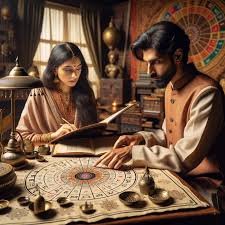In every culture across the world, there have always been traditional systems used to guide decisions, especially during times of uncertainty. In India, one such ancient method is Ramal Jyotish Shastra. Known for its mystical charm and deep spiritual roots, Ramal Shastra is a form of divination that has been used for centuries to predict the future and help people make better life choices. This system is not just about fortune-telling, as it holds a strong place in our cultural beliefs and everyday decisions, whether in family matters, marriage, business, or travel.
Let’s explore how this age-old wisdom has influenced cultural decision-making and why many still turn to it today.
What is Ramal Jyotish Shastra?
Ramal Jyotish Shastra is an ancient Indian astrology system that uses a unique method of prediction. Unlike the popular Vedic astrology, which depends on planetary positions and birth charts, Ramal astrology is based on symbolic calculations done using dice, cowrie shells, or even drawn symbols known as Ramal Rekhas (lines and dots).
This science was believed to have originated from the wisdom of ancient seers, and is also known as “The Astrology of Patterns”. The process seems simple, but the interpretations are deeply intuitive and insightful. It is often referred to as the Indian version of the Arabic Ilm-e-Ramal or geomancy, which means predicting events using patterns formed on the ground or paper.
Ramal Shastra in Indian Cultural Life
India has always had a spiritual foundation in its cultural systems. From choosing the right time to start a journey to selecting the most auspicious day for a wedding, decisions have traditionally been taken with the help of astrology. Ramal Shastra is one of the powerful tools used in such cases, especially when people need quick, symbolic guidance.
For example, in rural India, many families still visit a Ramal expert before major festivals or events to know what kind of energy surrounds the house. Farmers often consult before planting crops, while businesspeople may check before signing contracts. Even in love and marriage, people ask whether the match will be successful based on Ramal readings.
Cultural Decisions Influenced by Ramal Shastra
1. Marriage and Relationships
Marriage is one of the biggest life decisions in Indian society. While kundali matching is popular, some communities also rely on Ramal Shastra to confirm the match. Ramal readings help determine if a couple’s future will be happy, whether any doshas (problems) are present, or if any ritual is needed before the wedding.
2. Naming Ceremonies and Birth-Related Rituals
When a child is born, some families use Ramal Jyotish to know the child’s lucky direction, color, or name letter. This traditional approach ensures that the name aligns with the child’s future energies and avoids negativity.
3. Travel and Relocation
In ancient times, kings would consult Ramal experts before setting out for war or a long journey. Even today, people turn to this practice before traveling for work or moving abroad. The guidance helps avoid obstacles and make timely decisions.
4. Health and Healing
While Ramal Jyotish does not replace medical advice, it is sometimes used to understand hidden causes behind illnesses or repeated health issues. Many people believe that energy patterns revealed through Ramal can point toward spiritual imbalances or karmic reasons behind suffering.
5. Business and Finance
New businesses, land purchases, or important investments are often started on dates suggested through Ramal readings. The advice can indicate whether a deal will be profitable or if it should be postponed.
6. Conflict Resolution and Legal Matters
When people are stuck in court cases or family disputes, some take help from the Ramal Shastra to gain clarity on how things might turn out. While not legally binding, it offers peace of mind and helps make practical decisions.
Why Ramal Jyotish Still Matters Today
In the age of science and smartphones, one might wonder why people still turn to such old systems. The answer lies in the need for emotional comfort, belief, and cultural connection. Ramal Shastra offers something that data and technology can’t, as it connects the mind and spirit.
People often say that Ramal gives them a fresh point of view. Unlike standard logic, this practice helps individuals listen to their inner voice and aligns their path with energies that may not be visible but deeply felt.
Another reason is accessibility. You don’t need a birth chart or exact time of birth for a Ramal reading. This makes it useful for those who don’t have birth details or when quick guidance is needed.
Real-Life Impact: A Story to Remember
Let’s take the story of Neha, a young woman from Jaipur. She was confused about whether to accept a job offer abroad. She had consulted many people but still felt unsure. Finally, her grandmother suggested she speak to a Ramal astrologer.
The astrologer used Ramal Jyotish symbols and told her that the opportunity was good, but only after the next two lunar cycles. He also told her to avoid starting the paperwork immediately. She listened, delayed the process a bit, and during that time, the company upgraded her offer—giving her a better package and role.
Neha now believes that Ramal Shastra helped her not only avoid a hasty decision but also gain something better. This is how Ramal continues to influence personal and cultural decisions even today.
Final Words
In a world where choices are endless and confusion is common, systems like Ramal Jyotish Shastra act as a spiritual compass. They don’t claim to change fate but offer clarity, timing, and insight that can make life’s journey smoother.
Whether you are planning a marriage, starting a business, facing tough choices, or just curious about what lies ahead, Ramal Shastra can be your guide. It’s not about superstition, as it’s about trusting tradition and inner guidance.







